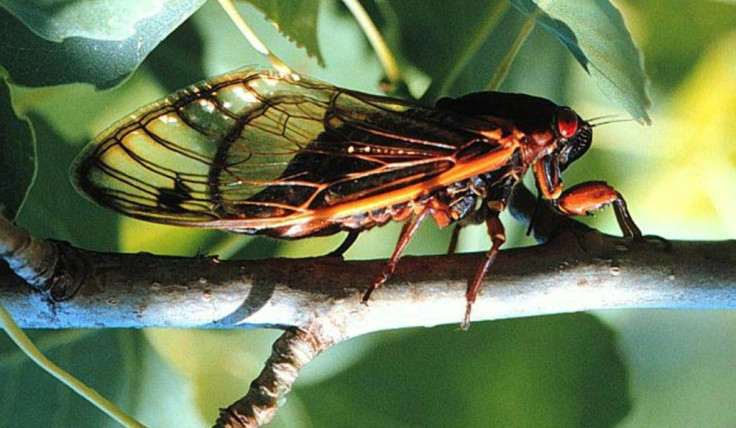Cicada Swarm: Everything You Need To Know About The Brood X Periodical Insects
After 17-years, the cicada is rearing its head, just in time for the summer.
This group of insects is known as the Brood X periodical cicada, and they are expected to make an appearance in at least 15 states of the East Coast and Midwest this season.
At first, cicadas have a white appearance, which sheds as they develop an exoskeleton and their yellow and black coloring.
During their reemergence, the cicadas will shed their skin and spend the next four to six weeks mating, when the females will lay up to 500 eggs each and then die, NPR said.
Once the eggs are hatched, about four to six weeks after being laid, the cicadas’ offspring will head back underground, where they won’t be heard from until 2038, when they will emerge again.
Swarms of cicadas have already been sighted, with social media users posting photos of the insects to their accounts.
They are only out every 17 years, but at least when they are, they pose for photos! #BroodX #cicadas #CicadaWatch2021 #cicadas2021 #Tennessee pic.twitter.com/zp0QInrpgb
— Sophia Carmel Turner (@SophiaCarmelT) May 18, 2021
Yeah... we have a few #cicadas up here in Silver Spring MD. #BroodX pic.twitter.com/GTzO2QScGi
— Mitch Zuckerman (@ec0p0lis) May 18, 2021
But do people have to be concerned about their arrival this summer?
Mostly, cicadas are annoying and loud.
Michael Raupp, an emeritus professor of entomology at the University of Maryland, told USA Today, they will spend two to four weeks “courting, mating, flying, driving people crazy, being eaten by everything.”
He continued by saying they can emit between 80 to 100 decibels, which is the equivalent of a low flying airplane or lawnmower.
The males are the noisemakers as they generate sounds to attract females to mate, which should decrease in intensity within two weeks of arrival, Gene Kritsky, a periodical cicada expert and dean of Behavioral and Natural Sciences at Mount St. Joseph University in Cincinnati, told USA Today.
While people will see cicadas in swarms, they don’t have to be threatened by them like they do bees or wasps as they don’t sting or bite, Kritsky told the news outlet.
Pets or other animals will be safe if they eat a few as well, he added.
Getting rid of cicadas isn’t an easy task either, as Kritsky said, “If you see a group of cicadas, you've got to just let cicadas be cicadas.”
He maintained that bug sprays won’t work as cicadas don’t have pads like cockroaches to pick up pesticides, but he noted they won’t chew gardens or plants.
However, this year the cicadas may be especially active due to a fungus called Massospora, which produces compounds of cathinone – an amphetamine that essentially increases the insects’ sex drive, NPR reported.
The fungus causes their body to lose control and pushes their mating into overdrive, which Matt Kasson, an associate professor of forest pathology and mycology at West Virginia University, told NPR “is stranger than fiction.
"To have something that's being manipulated by a fungus, to be hypersexual and to have prolonged stamina and just mate like crazy."
The fungus spore infects the bug once it rises above the ground and sheds its skin, where Kasson said a “white plug of fungus” starts to grow in place of the cicada’s butt.
The insects aren’t in any pain, Kasson believes, and he estimates that it affects about 5% of the cicadas that have reemerged.

© Copyright IBTimes 2025. All rights reserved.





















